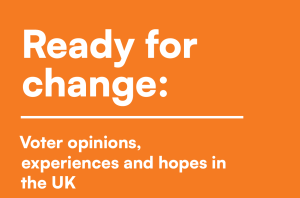
May 4th, 2010
Hung Parliament: The Facts
By KatyW

Over the past week, 38 Degrees members have been working together to make a factsheet that sets the story straight about what a hung parliament would mean. Here it is:
38 Degrees Hung Parliament Factsheet
What’s this factsheet for?
There are a lot of scare stories in the press at the moment about what a hung parliament would mean. Nearly 90% of 38 Degrees members said last month that they thought it offered a real chance to change politics for the better. That’s why we’re working together to set the story straight.
Who made this factsheet?
38 Degees members from across the UK came together last week to make this factsheet to bust some of the the main myths and scare stories about a hung parliament.
What is a hung parliament?
A hung parliament means that no one political party wins the election outright. Instead, parties have to work together to get things done in a coalition government. Many people think that the name ‘hung parliament’ is too negative. A alternative name is “balanced parliament”.
The Scare Stories
1. A hung parliament means weak and ineffective government.
38 Degrees members said: This isn’t true. There are examples of coalition governments working well all over the world, from Germany and New Zealand to the Scottish Parliament and Welsh Assembly in the UK. We won the Second World War under a coalition government.
2. A hung parliament would mean no decisive action to secure our economic recovery.
38 Degrees members said: Again, this is not true. The evidence shows that coalition governments are better at ensuring financial recovery. A recent study from the House of Commons showed that 7 out of 10 of the largest fiscal consolidations (that means reductions in government debt) in OECD member countries since 1970 have been carried out under coalition governments. [1]
Business leaders agree. The Director-General of one of the biggest business lobby groups in the UK has said that a coalition government could ‘work well’, and even be stronger than a government with one party in charge. [2]
3: Markets would react badly to a hung parliament, meaning economic disaster for the UK.
38 Degrees members said: The markets aren’t worried about the idea of a hung parliament. Moody’s, a leading credit agency, has said that a hung parliament could be ‘quite positive’. [3]
Investment bank Goldman Sachs says that investors “have become a lot more comfortable” with the idea that no one party may have a clear majority. [4]
4: The Liberal Democrats aren’t a credible party to be part of a coalition in charge of the country.
38 Degrees members said: A recent poll showed that if voters thought the Lib Dems had a chance at power, nearly half of them would vote Lib Dem at the general election.[5]
If many people in the UK vote for the Lib Dems in this year’s election, it’s fair that they should be involved. It would also send an important signal to Labour and the Conservatives that reform is needed at Westminster.
5: If there’s a hung parliament the party with the majority will just call another election in 6 months and we’ll have to do it all again.
38 Degrees members said: There’s a risk that a coalition government might call another election, but that’s a risk with all types of government. A hung parliament could mean we get political reform which would make governments more accountable to us – like fixed term Parliaments.
The Positive Case
It’s important to put forward the positive case for a hung parliament, too. Here are some of the key reasons why a hung parliament could be a good thing.
1. A hung parliament means more representative government.
Our first-past-the-post voting system means that at the moment we have a government that only won 35% of the vote. A hung, or balanced Parliament will better represent what the voters want, and will force MPs to the more thoughtful of and responsive to public opinion.
2. A hung parliament could mean reform of the voting system.
As a condition of forming part of the governing coalition, the Liberal Democrats could demand a reform of our voting system – like introducing proportional representation. This means that a hung parliament could result in vital changes to make our voting system fairer.
3. A hung parliament means people getting interested about politics again.
A parliament where there is real debate on real issues, where power is still ‘up for grabs’, will encourage people to get involved in the political process, because they feel that they can have a say in parliamentary decisions. If one party simply ‘wins’ and starts running the country on its own, many people will feel that their voices are not being heard, and they will lose interest.
[1] http://www.guardian.co.uk/commentisfree/2010/mar/03/dont-be-afraid-of-hung-parliament
[2] http://business.timesonline.co.uk/tol/business/economics/article7107223.ece
[3] http://www.tdwaterhouse.co.uk/news/newsitem.cfm?newsid=429599
[5] http://today.yougov.co.uk/commentaries/peter-kellner/could-lib-dems-win-outright

















